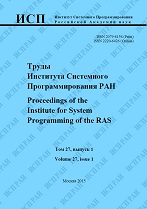|
Metrics of efficiency and productivity when using the evolutionary algorithm on desktopgrid
N. P. Khrapov
Kharkevich Institute for Information Transmission Problems of the RAS
Abstract:
The scope of voluntary computing systems is constantly expanding. The BOINC system is currently the most famous for organizing volunteer computing. There are many scientific papers on the adaptation of various computational algorithms to the BOINC. The topic of the presented work is the effective adaptation of the evolutionary algorithm to voluntary computing systems. The reasons for productivity losses are considered, criteria and metrics for evaluating the quality of the algorithm are introduced. The content of the article consists of two main parts. The first part of the article discusses general metrics that can be used to assess the performance of various computational algorithms within BOINC. The problem of adaptation of the evolutionary algorithm is considered in the second part of the article. Two main problem-specific causes of productivity loss are considered: the effect of waiting for the last job and the effect of a common queue. Methods are proposed for quantitative assessment of the influence of various systemic effects on the performance of an evolutionary algorithm. The proposed metrics can be used in a comparative analysis of various job scheduling policies when performing calculations. The metrics can be calculated both during the actual and simulated calculations.
Keywords:
grid systems, distributed computing, evolutionary algorithm, efficiency, performance.
Citation:
N. P. Khrapov, “Metrics of efficiency and productivity when using the evolutionary algorithm on desktopgrid”, Proceedings of ISP RAS, 32:4 (2020), 133–140
Linking options:
https://www.mathnet.ru/eng/tisp529 https://www.mathnet.ru/eng/tisp/v32/i4/p133
|

| Statistics & downloads: |
| Abstract page: | 78 | | Full-text PDF : | 149 | | References: | 17 |
|




 Contact us:
Contact us: Terms of Use
Terms of Use
 Registration to the website
Registration to the website Logotypes
Logotypes









 Citation in format
Citation in format 